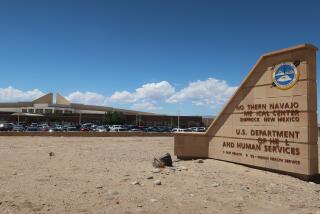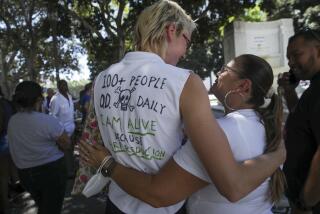Nearly 70,000 Americans die needlessly each year because they are not given optimal heart failure therapy
- Share via
Nearly 70,000 Americans die each year because they do not receive optimal therapy as called for in guidelines promoted by national health authorities, researchers said Monday. Physicians have been slow to implement many of the procedures called for in the guidelines, according to the first national study of adherence to the treatment goals, the team reported in the June edition of the American Heart Journal.
Heart failure, also known as congestive heart failure, occurs when the heart can no longer pump sufficient blood throughout the body. Causes include high blood pressure, infections that attack the heart, congenital heart disease, a heart attack, heart valve disease or some types of abnormal rhythms. Symptoms include shortness of breath, cough, swelling of feet and ankles, weight gain, irregular or rapid pulse, fatigue or weakness and loss of appetite. An estimated 5.8 million Americans suffer from heart failure and about 10% of them die each year from the condition.
Dr. Gregg D. Fonarow of UCLA’s Geffen School of Medicine and his colleagues studied six evidence-based therapies for heart failure, using data from clinical trials, in-patient and out-patient registries for heart failure patients, quality-of-care studies and other published sources.The six treatments are highly recommended for heart failure patients by the American College of Cardiology and the American Heart Assn. The researchers found that 2,644,800 heart failure patients were eligible for the therapies, but did not receive them. The total number of potential deaths that could be prevented each year with optimal implementation of all six therapies is 67,996, they reported.
The therapies included four different families of drugs, cardiac resynchronization therapy (which helps coordinate heart contractions) and implantable cardioverter-defibrillators (which shock hearts beating erratically back into a normal rhythm). The estimated number of lives that could be saved by wide implementation of each therapy, they estimated, are:
-- Aldosterone antagonists, 21,407.
-- Beta blockers, 12,922.
-- Angiotensin-converting enzyme (ACE) inhibitors, 6,516.
-- Hydralazine/isosorbide dinitrate, 6,655.
-- Cardiac resynchronization therapy, 8,317.
-- Implantable cardioverter-debrillators, 12,179.
The findings “have significant clinical and public health implications” because tens of thousands of lives could be saved with optimal implementation of the therapies, Fonarow said in a statement. Pointing out which therapies are not sufficiently used, he added, will push clinicians toward a more careful examination of their treatment strategies.






